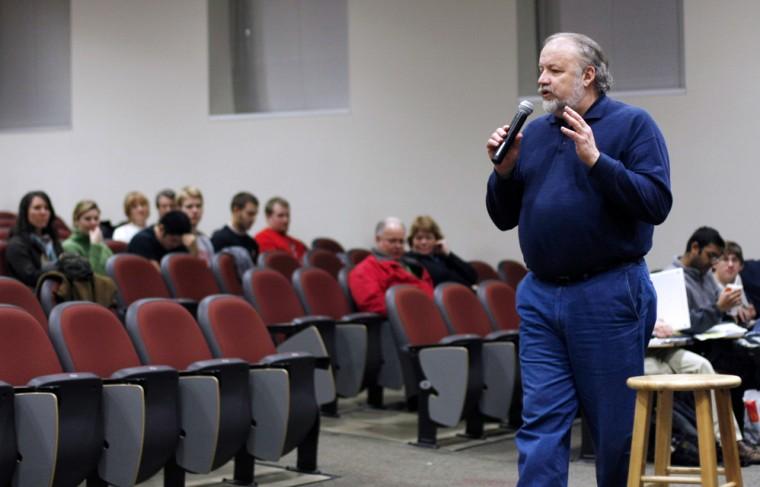One of Wither’s lecture halls was filled Monday night 7 p.m. with people ready to hear from Dr. Gary Habermas, a philosophy professor at Liberty University, on the subject of near-death experiences and the afterlife.
The event, hosted by Ratio Christi Apologetics and Chi Alpha Christian Fellowship, was intended to answer some tough questions about people who claim to have had an out-of-body experience while they were proclaimed clinically dead.
Habermas said he is mostly interested in near-death cases where evidence has supported the stories of patients who, after being revived, said they experienced sensory phenomena while technically dead.
“I’m not trying to claim there is no conceivable way to explain these things. But after a while, you start to ask why these things happen,” Dr. Habermas said.
Curtis Hrischuk, who helps lead the student club Ratio Christi, said the goal of the lecture was to start a dialogue about the tough questions both Christians and non-Christians have in today’s society.
“Their heart has stopped, their brain has no activity, but they can recount what happens. Things they cannot know about,” Hrischuk said. “This is important because it suggests that naturalisms and atheisms are not truth. Here we have scientific evidence that we are more than our bodies.”
Amanda Vuke, the publicist for Ratio Christi, said they were hoping the event would get students to raise more questions.
“We seek to help find answers and ask the big questions of life. We hope to help students think about their life,” Vuke said. “He went through and gave numerous cases of near death experiences that were evidence based. He showed that there’s more to this life and more to this world than we can see. There’s an immaterial side to this reality.”
Eric Rountree, a sophomore in chemistry, said he liked the lecture because Dr. Habermas was not trying to force religion on people.
“It was a scientific perspective, not really a religious perspective, which makes it easier for a lot of people to believe,” Rountree said.
After the lecture part of the event, Habermas opened up a question and answer session.
Ashley Jones, a senior in communication, said there were many good questions posed about people who had “bad” experiences.
“There were a lot of bad experiences about people who said they had experienced hell. But Dr. Habermas said there was no evidence. He was trying to use a scientific study of it rather than people’s subjective experiences,” Jones said.
Hrischuk said the question and answer session was interesting because people were really challenging Habermas’s position.
“People were pretty skeptical. They were devoted to finding weaknesses in the position,” Hrischuk said. “Dr. Habermas came up with a good rebuttal for them.”
Jones said the lecture reaffirmed what she already believed, but thought non-Christians would get something out of it as well.
“If I had been agnostic it would have caused me to think about the afterlife,” Jones said. Jones also mentioned she had a personal connection to the idea of near-death experiences through her father, who had a seizure and claimed to have spoken to his uncle.








